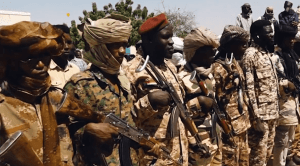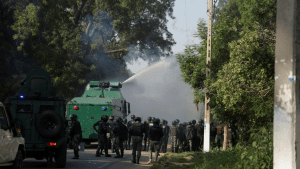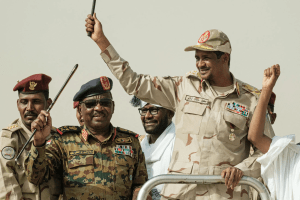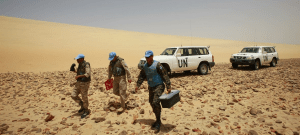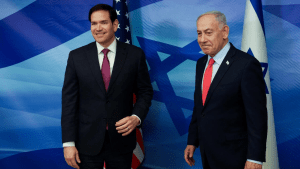Oussama Romdhani: Libya threatened by foreign competition

Field Marshal Khalifa Haftar’s meeting on May 10 at the Kremlin with Russian President Vladimir Putin drew attention once more to the Libyan strongman’s ever-growing ties to Moscow.
Visiting Russia to attend the celebration of the 80th anniversary of the country’s victory over Nazi Germany, the commander of the Libyan National Army (LNA) also met a number of top Russian military figures, including Defence Minister Andrey Belousov.
For some time, Haftar’s Russia connection has been a matter of great concern to the US and Europe, which has led to a renewed focus on Libya and paving the way for an unprecedented flurry of US contacts with officials from western and eastern parts of the country.
In early May, the minister of defence of the Tripoli government, Abdulsalam Al-Zoubi, was received in the Pentagon. He was the first Libyan defence official to hold talks in Washington in years.
Saddam Haftar, the son and presumably pre-ordained successor to Khalifa Haftar, was also welcomed for a meeting with several senior US officials at the State Department, in late April.
During the same period, Haftar’s other son, Belqassim, was the guest of honour at a business forum in Washington.
As part of a well-calibrated effort to treat Tripoli and Benghazi as equals in the ongoing diplomatic-military dance, the USS Mount Whitney (LCC-20), a US 6th Fleet vessel docked last April in the ports of both Tripoli and Benghazi.
In February, two US Africa Command (AFRICOM) generals visited Libya where they met leaders in Tripoli and Benghazi, including Khalifa and Saddam Haftar, as well as GNU Prime Minister Abdulahamid Dbeibah.
The State Department summed up Washington’s objectives as continuing “to engage officials from western and eastern Libya and to support Libyan efforts to unify their military institutions as Libyans secure their autonomy.”
Behind the US outreach, as explained by US Army Lieutenant General John W Brennan, Deputy Commander of AFRICOM, there was before anything else a US desire “to defeat malign actors who threaten North Africa and US security interests.”

Fears of “malign actors” unmistakably meant Russia.
US re-engagement has in fact mirrored NATO’s realisation, as expressed by the alliance’s May 2024 independent expert report about its southern neighbourhood strategy, that “Libya deserves particular attention” in North Africa.
Part of that strategy was to court Haftar in the hope of weaning him away from reliance on the Russians. Haftar’s ties to Moscow and his frequent meetings in Benghazi with Russian Deputy Defence Minister Yunus-Bek Yevkurov were a source of utmost concern.
The US even sent two B-52 Stratofortress bombers to “conduct Libyan military tactical air controllers” near Sirte. In August 2024, AFRICOM Commander, General Michael Langley, met Haftar in Benghazi.
There is however a lot of scepticism about Washington’s ability to win over Haftar, considering his deeply-vested interests with Moscow.
Nevertheless the US seemed willing to takes its chances with the LNA commander as concerns about Russian encroachment mushroomed since Moscow started redeploying troops and materiel from Syria to Libya, in December 2024, hence making the North African country its de facto launch-pad for the rest of the continent.
With nearly 2,000 to 2,500 Russian “Africa Corps” troops reportedly present in several military bases in Libya, NATO saw a growing threat to the security of Europe especially since Russia’s military deployment was coupled with anti-Western disinformation campaigns, which could only worsen NATO’s image problem.
The Atlantic alliance was often blamed for the legacy of chaos and strife in Libya and the Sahel since it backed the uprising which toppled long-time ruler Muammar Gadhafi in 2011 but subsequently bailed out without a proper exit-strategy.
Now, Western strategists see a Russian threat in the Mediterranean including a naval presence in Libya and possible attempts to weaponise migration flows across the sea from Europe.
Moscow is also suspected of using Libya as a launchpad for activities south of the Sahara. During the last three years, the West’s position in the Sahel region has deteriorated while Russia has moved in. France was pushed out of Mali, Niger, Burkina Faso, Senegal and Chad, while the US had to depart its anti-terrorism base in Niger.
“The role played by foreign powers has been too often a measure of Libyan protagonists’ dependence on outside forces to ensure their own political survival and promote their selfish agendas”
The competition between international and regional powers comes with a cost to Libya which finds itself caught in the middle while its vantage point is rarely considered.
The struggle for influence is dragging Libyans into fights that are not their own and is making the murky Libyan political landscape even murkier.
The Russian military bases (but also other bases that host foreign troops such as Turkey’s) do not project a sense of Libya’s sovereignty nor guarantee its peace. Outside military presence can only add to the fragmentation of Libya’s domestic scene by entrenching the already deep domestic divides around foreign actors.
Recent episodes have also shown that competition for influence between foreign powers can fuel factional strife within Libya.
The latest reports about the US intent to deport illegal migrants with a criminal record to Libya threw the country’s social media into a frenzy as people wondered if Washington was taking advantage of the muddled political scene and exploiting its vulnerabilities to carry out a questionable agenda that could only further destabilise Libya.
On May 23, US Secretary of State Marco Rubio linked the leaked news reports of Washington’s attempted deportation of criminal elements to Libya and other parts of Africa to Libya’s upheaval saying they have emboldened rebel forces in Libya, igniting the worst street fighting in three years in the Libyan capital.
That particular episode has created many doubts over the US strategy in Libya as Washington seemed to be prioritising a set of expedient objectives despite their predictably adverse effects on the North African country.
The uproar which erupted in the first week of May over the shocking video of kidnapped MP Ibrahim el-Dirsi (held with chains around his neck) was seen by many in Libya as an attempt by Haftar’s rivals to quash Washington’s overtures to the LNA commander.
Amid the turmoil which engulfed Tripoli at the end of May over the future of the Dbeibah government, Russia and Turkey tried to paint their encroachment in Libya “in order to prevent a new escalation that threatens to turn into a resumption of hostilities”.
Moscow and Ankara were clearly putting the best face on their more self-serving agendas. Most Libyans suspect foreign actors of being after the country’s oil, gas and vast underground riches. They believe Libya’s stability is at best a secondary goal for regional and international powers seeking to curtail the footprint of their rivals. But nobody consulted them before inviting foreign armies and their mercenary subordinates and none of the local sponsors is seriously discussing their removal.
It is true that the United Nations and some people of goodwill have spared no effort to help Libyans steer the ship of state to safe harbour despite the stormy seas. But the complex web of intertwined interests between domestic and foreign stakeholders has so far caused an insurmountable headwind blocking any real progress.
Furthermore, the role played by foreign powers has been too often a measure of Libyan protagonists’ dependence on outside forces to ensure their own political survival and promote their selfish agendas in an environment awash in corruption and human rights abuses.
READ: The West may reach an agreement with Russia over Libya
Not much headway towards a political process that would ensure the reunification of the country’s institutions is possible until vying Libyan actors themselves are convinced of the need to put Libya’s interests first. That might mean waiting for another generation of wiser and less greedy elites.
The views expressed in this article belong to the author and do not necessarily reflect the editorial policy of Maghrebi.org. Oussama Romdhani is the editor-in-chief of The Arab Weekly and was the former propaganda minister in the Ben Ali regime.
If you wish to pitch an opinion piece please send your article to alisa.butterwick@maghrebi.org.
Want to chase the pulse of North Africa?
Subscribe to receive our FREE weekly PDF magazine











